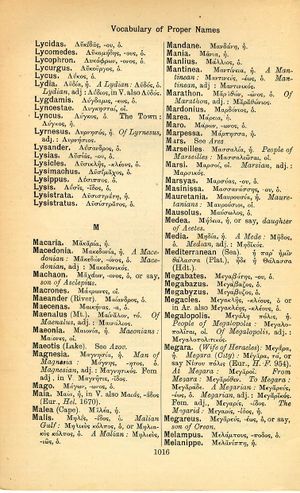Marsyas
βωμὸν Ἀριστοτέλης ἱδρύσατο τόνδε Πλάτωνος, ἀνδρὸς ὃν οὐδ' αἰνεῖν τοῖσι κακοῖσι θέμις → Aristotle had this altar of Plato set up — Plato, a man whom the wicked dare not even mention in praise
English > Greek (Woodhouse)
Μαρσύας, -ου, ὁ.
Latin > English (Lewis & Short)
Marsyas: ae, m., the name of several rivers.
I A river in Greater Phrygia, which flows into the Mæander, now Tschinar Tchai, Ov. M. 6, 400; Liv. 38, 13, 6.—
II The name of two rivers in Syria, Plin. 5, 23, 19, § 81; id. 5, 24, 21, § 86.
Marsyas: and Marsya, ae, m., = Μαρσύας,
I a satyr who challenged Apollo to a trial of skill on the flute, and whom the latter vanquished and flayed alive, Liv. 38, 13, 6; Ov. F. 6, 705; id. M. 6, 383; App. Flor. 1, 3, p. 113; Luc. 3, 207; Stat. Th. 4, 186; near his statue in the Roman forum was the place for the transaction of business, Hor. S. 1, 6, 120; Mart. 2, 64, 8; Sen. de Ben. 6, 32, 1; cf. Juv. 9, 2.
Latin > French (Gaffiot 2016)
Marsўās et -sўa, æ, m.,
1 Marsyas [satyre, célèbre joueur de flûte] : Liv. 38, 13, 6 ; Ov. F. 6, 705 ; Luc. 3, 207 ; Stat. Th. 4, 186 || statue de Marsyas : Hor. S. 1, 6, 120 ; Mart. 2, 64, 8 ; Sen. Ben. 6, 32, 1
2 fleuve de Phrygie : Liv. 38, 13, 6 ; Ov. M. 6, 400
3 fleuve de Syrie : Plin. 5, 81 ; 5, 86.
Latin > German (Georges)
Marsyās, ae, Akk. ān, m. u. Marsya, ae, m. (Μάρσύας), I) ein Satyr, Meister im Flötenspiel, der Apollo zu einem musikalischen Wettstreit herausforderte, aber von ihm besiegt u. zur Strafe für seinen Übermut geschunden wurde, Liv. 38, 13, 6. Ov. met. 6, 383; fast. 6, 705. Apul. flor. 3. p. 3, 15 Kr. Seine Statue stand in Rom am Markte (Iuven. 9, 2 gemeint) an der Rednerbühne; in ihrer Nähe betrieben nicht nur Rechtsanwälte ihre Geschäfte, sondern fanden sich auch Verliebte zusammen, Hor. sat. 1, 6, 120. Mart. 2, 64, 7. Sen. de ben. 6, 32, 1. – II) ein Fluß in Großphrygien, der in den Mäander mündet, Liv. 38, 13, 6; vgl. Ov. met. 6, 400. – / Über die lat. Form Marsya (no. I) s. Bentl. Opusc. phil. p. 520 ed. Lips. – Schreibung Marsua, Mart. 2, 64, 8. Plin. 21, 8 u. 9 D.

